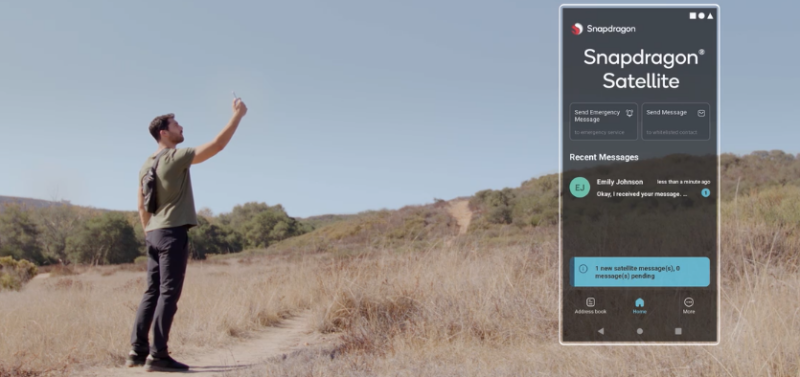Latest News

A visualization of Qualcomm’s Snapdragon Satellite messaging. Screenshot via Qualcomm.
Qualcomm is ending its direct-to-device relationship with Iridium because smartphone manufacturers are not adopting the satellite-compatible chips. Analysts say the price and the lack of technology standards were contributing factors.
The partnership, unveiled at CES in January, was seen as the Android answer to Apple’s emergency messaging via satellite, with the potential to connect IoT devices and vehicles in the future.
Qualcomm demonstrated that the Snapdragon Satellite platform is capable of messaging on Iridum’s L-band network. The chipset was offered as an option in the flagship Snapdragon 8 Gen 2 Mobile Platform, which is used on Samsung, Motorola, OnePlus, and other phones.
But adoption didn’t take off. A number of OEMs signed on, but those activations were pushed to 2024. Samsung skipped out on the satellite connectivity in its Galaxy S23. There are reports that the Samsung Galaxy S24 will include satellite connectivity — but with this news, it looks like Iridium won’t be the satellite provider.
Qualcomm is terminating the agreement effective Dec. 3. Iridium’s stock dropped 5.5% on Friday after the announcement on Nov. 9.
Iridium said it will be pursuing new relationships with device OEMs, chipmakers, and developers.
“While I’m disappointed that this partnership didn’t bear immediate fruit, we believe the direction of the industry is clear toward increased satellite connectivity in consumer devices,” Iridium CEO Matt Desch said in a statement. “Led by Apple today, MNOs and device manufacturers still plan, over time, to provide their customers with expanded coverage and new satellite-based features, and our global coverage and regulatory certainty make us well suited to be a key player in this emerging market.”
Iridium had a service provider agreement with Qualcomm and would have received royalties for devices sold and network usage fees. But with the uncertain adoption timeline, Iridium did not factor Qualcomm service revenue into its official guidance. Therefore, the cancellation doesn’t affect Iridium’s guidance for this year, or the company’s projection to hit $1 billion in annual service revenue by 2030.
Iridium also hinted at the opportunity for a future narrowband non-terrestrial network (NTN) service. At an investor day in September, Desch said the operator is in the “very early stages” of looking at a narrowband IoT investment for use cases like agriculture and asset tracking. He said it would be a low average revenue per user IoT service with high latency for low-cost devices — different from the company’s “premium IoT.”
“Companies electing to adopt an Iridium solution today will have long-term service certainty and can be involved in Iridium’s narrowband non-terrestrial-network service development planning,” the company said Thursday.
Price and Standards Hindered Adoption, Analysts Say
The writing was on the wall for months that something was off with the Qualcomm deal, William Blair analyst Louie DiPalma said in a research note on Friday. DiPalma said both price and technology were contributing factors.
“Qualcomm conveyed to us that even though the Iridium service was functional and available for smartphone manufacturers to incorporate in their phones, the smartphone manufacturers did not have a ‘line of sight on the monetization models,’” DiPalma wrote. “This implies that smartphone manufacturers were concerned about the economics and were objecting to the price Qualcomm was charging.”
Peter Kibutu, advanced technology lead for NTNs at tech consultancy firm TTP, argued the Qualcomm chip wasn’t adopted because it relied on Iridium’s proprietary technology versus standards-based tech.
“The use of proprietary solutions constrains the connectivity to individual satellite networks and doesn’t take advantage of the vibrant standards-based ecosystem,” Kibutu said in a statement to Via Satellite. “The long-term solution, and one that Qualcomm says it expects to continue exploring with Iridium, will be based on 3GPP NTN standards and will leverage existing industry ecosystems. This openness is what will enable the mass adoption of direct-to-device NTN services.”
There is debate within the satellite industry about how big the direct-to-device opportunity is, and the best way to address the market. Apple’s partnership with Globalstar — and Qualcomm’s partnership with Iridium — requires smartphone hardware that is compatible with existing satellites using licensed mobile satellite services (MSS) spectrum.
SpaceX, AST SpaceMobile, and Lynk Global, are taking a different approach — designing satellites to communicate with unmodified cell phones, using terrestrial spectrum through partnerships with mobile network operators.
Get the latest Via Satellite news!
Subscribe Now